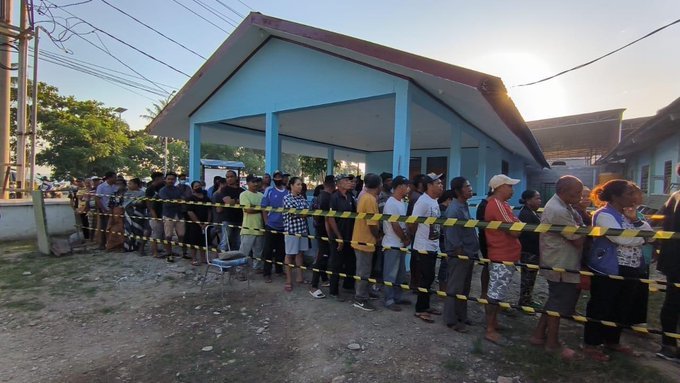
The state of civic space in Timor-Leste remains rated as ‘obstructed’ by the CIVICUS Monitor. Fundamental freedoms are generally respected by the authorities, as noted in March 2023 by the US Department of State in their country report on human rights practices. Further, the government has created an enabling environment for human rights defenders. However, there continues to be concerns about attempts by the government to introduce draft laws related to criminal defamation. There have also been reports of restrictions on the right to peaceful assembly and the arbitrary arrests of protesters.
Timor-Leste voters headed to the polls on 21st May 2023 for parliamentary elections, the country’s fifth since the country gained full independence in 2002, following decades-long occupation by Indonesia.
Seventeen parties were competing in the election, but two, the National Congress for Timorese Reconstruction (CNRT), led by independence hero Xanana Gusmao, and The Revolution Front for an Independent Timor-Leste (Fretilin), led by resistance figure Mari Alkatiri, were expected to dominate. The two men are considered independence-era icons and are veterans of Timor-Leste politics.
From 19th April to 18th May 2023, political parties held rallies and other election activities often featuring local cultural traditions and music, and massive motorbike caravans in Dili that brought together tens of thousands of supporters from both inside and outside the capital.
On 23rd May 2023, official results showed that Xanana Gusmao’s party had won the parliamentary elections, securing 31 of those seats, but was short of an outright majority. The opposition CNRT led with 41.6% of the votes, while its main rival and incumbent coalition leader Fretilin got 25.7%, according to the electoral commission. The remainder was split among 15 parties. The result paves the way for a return to power for Gusmao, Timor-Leste’s first president if he can form a coalition.
Expression
Progress in global press freedom rankings
Timor-Leste makes top ten in 2023 World Press Freedom Index #PNG https://t.co/M6I3LQJdpq pic.twitter.com/I0q73zm0vf
— Raet Lomi (@raetlomi) May 3, 2023
In a positive signal for media freedom in Timor-Leste, global media watchdog Reporters Without Borders (RSF) ranked the country in 10th place in their press freedom index published in May 2023, moving up from 17th place in 2022.
RSF stated that the country’s media are among the freest in the region and Articles 40 and 41 of the constitution protect freedom of the press and of expression. The group also said that journalists are usually free to report the news and are rarely the targets of harassment or physical attacks.
At the same time, RSF said that politicians regard the media with some mistrust, which has been evidenced in several proposed laws hostile to press freedom. Further, journalists are also exposed to many forms of pressure that limit their freedom, including legal proceedings, intimidation and public denigration of the media by politicians.
Concerns about internet restrictions by youth
In February 2023, the Asia Foundation reported that their study on ‘Digital Youth in Timor Leste’ showed that young Timorese are aware of their digital rights and value the access to knowledge that the internet provides. But they are also aware that these liberties are fragile, and they are concerned that their access to information will be jeopardised if the government imposes internet restrictions.
Among these are plans since 2021 by the authorities to introduce draft cybercrime legislation to govern the use of social media and prevent the spread of "falsehoods, slander, and defamation." The proposed cybercrime law drew widespread criticism from the media, civil society and youth activists, who were concerned as it could be misused, and consequently stifle online freedom of expression and the right to privacy.
Peaceful Assembly
Rallies by political parties held without restrictions
Tomorrow is election day in Timor-Leste. Some election coverage here by @marianfaa @abcnews. https://t.co/qQvhwJRNyZ
— Vannessa Hearman (@vhearman) May 20, 2023
Around the general elections, there were no reports of restrictions to public gatherings held by political parties.
Freedom House in their 2023 report noted that while freedom of assembly is constitutionally guaranteed and generally respected in practice, some laws can be invoked to restrict peaceful gatherings.
As previously documented, Article 5 of the Law on Freedom of Assembly and Demonstration (No. 1/2006) places unreasonable restrictions on the right to the freedom of peaceful assembly by prohibiting assemblies and demonstrations ‘within less than 100m from offices of organs of sovereignty, residences of officeholders of organs of sovereignty, military and militarised installations, prison buildings, offices of diplomatic missions and consulates, and offices of political parties’.
Civil society has argued that this restriction prevents them from holding effective protests against the government and is inconsistent with international law. Because of the close proximity of government buildings and diplomatic missions in the capital, Dili, and its location close to the sea, the requirement under the Law on Freedom of Assembly and Demonstration makes it virtually impossible for protesters to organise a demonstration within sight and sound of their target.